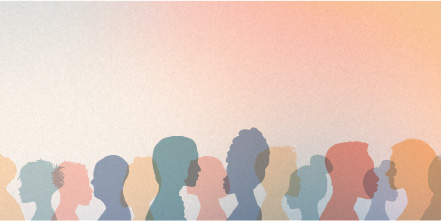When communities face violence or discrimination, the resulting trauma from these attacks can be difficult to heal. Finding ways to process your feelings, feel more grounded, and take action can support you and your community in healing together. Use this activity to help you make a plan for how you will take care of yourself and your community if your community is under attack.
This worksheet is an excerpt from Mental Health America’s 2024 BIPOC Mental Health Month Toolkit. This worksheet is also available in Spanish.
Here’s a web-friendly version of the activity from the worksheet:
Section 1: Pause and Reflect
After experiencing a traumatic event, it is important to allow yourself to feel your feelings. Take the time to process your emotions and reflect on what you and your community are going through.
- What happened? Describe the situation you and your community are coping with by writing or drawing.
- What emotions are you feeling as a result of the situation? Choose from the list below, or reference the worksheet, What’s Underneath? (Identifying Feelings), to help you identify your emotions.
- Anger
- Disappointment
- Sadness
- Rage
- Overwhelm
- Disgust
- Hopelessness
- Fear
- Numbness
- Anxiety
- Loneliness
- Confusion
- Frustration
- Other: _________________
- What changes have you noticed in yourself or your community since the event (emotionally, physically, socially, environmentally, etc.)?
Section 2: Feeling Safe
Experiencing a traumatic event can make you feel unsafe and unstable. Thinking of things that have provided you with a sense of security in the past can help you feel more grounded.
- What other resources, organizations, or faith communities exist near you that have supported you in the past? If you can’t think of any, some resources that you can access to support you during this time are: the Disaster Distress Helpline (1-800-985-5990), the THRIVE Lifeline (text “THRIVE” to 1-313-662-8209), or resources from Project LETS.
- What activities have you done in the past that have helped you feel more safe and stable? (Examples: listening to calming music, reading your favorite book, eating your favorite meal, etc.)
- What are some positive words or phrases you can say to yourself to help you feel more grounded? (Examples: I am courageous; I am loved, etc.)
Section 3: Taking Action
For some people, taking action can be a helpful way to cope with trauma. Once you have established your own sense of safety again, you may start to notice that you want to support the people around you or those who share your identity. This can increase feelings of connection and decrease feelings of helplessness. However, it is important to remember that you do not have to take action if you feel that you need time to heal in other ways.
- Before you get started, let’s make sure you have a game plan to stay mentally and emotionally grounded. What are some ways you can protect your mental health while you are advocating for your community?
- Think back to times where you’ve connected with others in your community or volunteered. Are there any actions you want to take to support yourself and your community?
- If you haven’t engaged in this way, here are some examples: collecting and sharing basic necessities, joining advocacy groups, hosting a community meal, facilitating healing circles, etc.
- After reflecting on how you would like to provide support to your community in the question above: What is a small, first step you can take toward providing that support?
"*" indicates required fields
"*" indicates required fields
"*" indicates required fields
"*" indicates required fields

